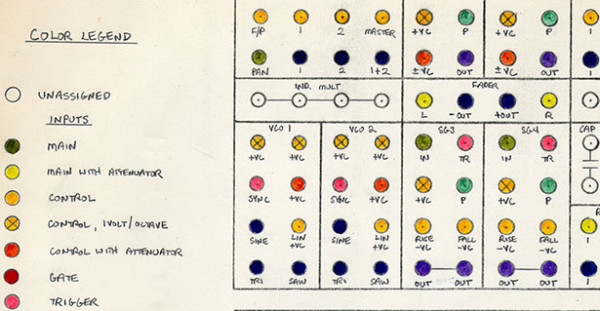The Experimental Television Center: A History, Etc . . .
At the Hunter College 205 Hudson Street Gallery
Opening October 24, 7-9pm

Analog control box documentation, Richard Brewster, 1980. Courtesy Experimental Television Center and the Rose Goldsen Archive of New Media Art, Cornell University.
This summer I contributed to a major archival effort to identify and process materials for this exhibition, and the acquisition of the Experimental Television Center Archives by the Rose Goldsen Library & Archives at Cornell University. Lots of amazing history on artist-run spaces and video art in NY State.
The Experimental Television Center: A History, Etc . . .
September 25–November 21, 2015
Opening: September 24, 7–9pm
Hunter College 205 Hudson Street Gallery
Hunter College MFA Campus, New York
Hours: Wednesday–Sunday 1–6pm
www.hunter.cuny.edu
goldsen.library.cornell.edu
www.experimentaltvcenter.org
For over 40 years, the Experimental Television Center (ETC) in Owego, New York was one of North America’s preeminent organizations for video art, fostering a community for creativity and innovation through its residency and tool-building programs. The Experimental Television Center: A History, Etc . . . is the first academic survey of the Center’s prolific yet under-recognized role in the evolution of video art. Through works of art, ephemera, and video processing tools, this exhibition maps the ETC’s influence within the larger narrative of the history of video into the digital and internet age.
From 1971 to 2011, over 1,500 artists participated in the ETC residency program, which functioned as a site for exploration, education, and practice for media artists. This exhibition spans works from the 1960s through the 2000s, including a collection of original analog instruments designed by artists/technologists, as well as two interactive installations featuring contemporary tools designed by Dave Jones, a long-time collaborator with ETC, and Jason and Debora Bernagozzi, founders of the new media organization Signal Culture in Owego, New York.
Organized by: Sarah Watson, Chief Curator of the Hunter College Art Galleries; Timothy Murray, Curator of the Rose Golden Archive of New Media Art; and Sherry Miller Hocking, Assistant Director of the Experimental Television Center.